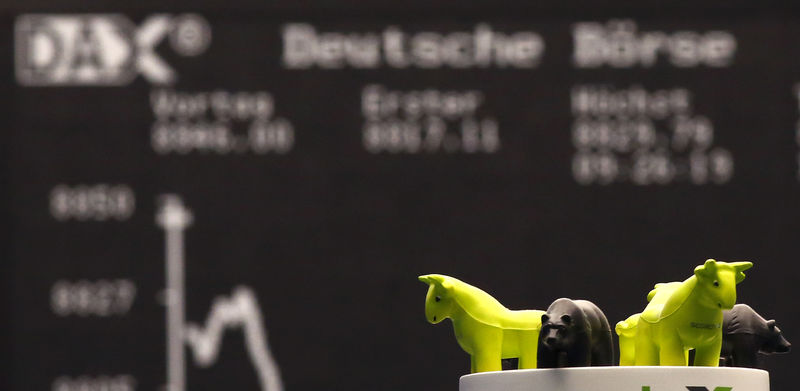By Peter Nurse
Investing.com - European stock markets slumped Wednesday, as investors continue to fret about the region heading into recession as inflationary pressures remain.
By 03:50 ET (07:50 GMT), the DAX in Germany traded 0.7% lower, the CAC 40 in France fell 0.5%, and U.K.’s FTSE 100 dropped 0.9%.
German industrial production dropped 0.3% on the month in July, data released Wednesday showed, a little better than the 0.5% drop expected, but the figures were flattered by the fact that school holidays started later this year, meaning that the usual summer drop in output was smaller than it otherwise would have been.
The outlook for Europe's largest economy continues to darken in the wake of the Russian invasion of Ukraine in February and the associated regional energy crisis, but the supply chain disruption caused by COVID-19 and, more recently, by the drought that restricted shipping on Germany's most important inland waterways have also weighed.
There is further data to study later Wednesday, in the form of second-quarter Eurozone GDP and employment numbers, and they are both expected to point to a deteriorating economic situation.
These numbers come just a day before the European Central Bank's next policy meeting, where the governing council is widely expected to aggressively lift interest rates to try and curb a runaway inflation trend even at the expense of growth in the region.
Elsewhere, new U.K. prime minister, Liz Truss, promised a major package of support this week to tackle soaring U.K. energy bills as she settled into her first day in office.
In the corporate sector, Uniper (ETR:UN01) stock fell over 6% as the German energy giant, the country’s biggest gas importer, suffers from Moscow’s decision to halt gas supplies.
Siemens Energy (ETR:ENR1n) stock fell 5.9%, near its 52-week low, after Gazprom (MCX:GAZP) blamed the German company for failing to fix faulty equipment, and hence the halting of gas exports, something it denies.
Finnair (HE:FIA1S) stock rose 0.4% after the carrier announced plans to reduce its fleet and cut costs in an attempt to solve its profitability problems.
Oil prices fell Wednesday, erasing all the week’s previous gains as COVID-19 lockdowns in China add to fears of slowing global economic growth and the associated hit to demand.
Data released Wednesday showed that Chinese crude oil imports fell 9.4% in August from a year earlier, as the country’s stringent COVID curbs kept a number of cities under lockdown, curbing people movement and oil demand at the world's top crude importer.
The oil market bounced at the start of the week after the Organization of the Petroleum Exporting Countries and allies, a group known as OPEC+, announced a cut in output of a modest 100,000 barrels per day in October.
By 03:50 ET, U.S. crude futures traded 1.4% lower at $85.70 a barrel, dropping to the lowest since Jan. 26, while the Brent contract fell 1.2% to $91.68, the lowest since Feb. 18.
Additionally, gold futures edged lower to $1,712.75/oz, while EUR/USD traded 0.1% lower at 0.9896.
